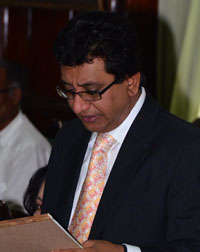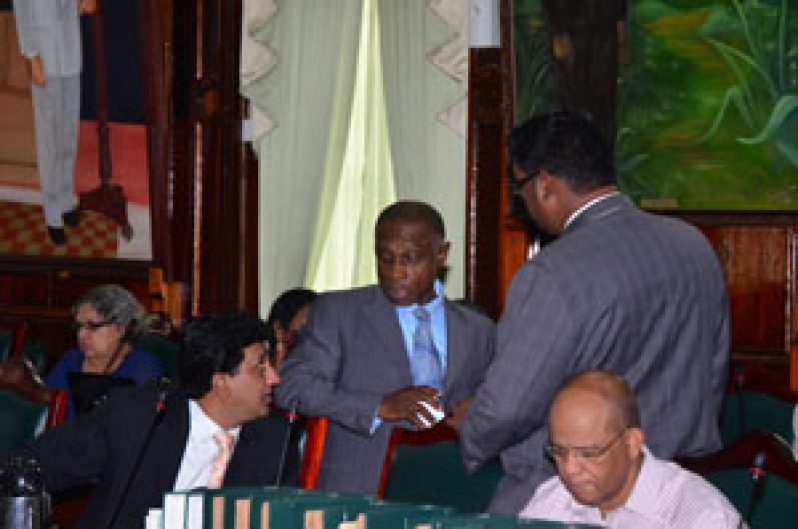THE combined Opposition last evening rejected an amendment to the nation’s Customs Laws that has seen Guyana’s obligations to the Caribbean Community’s (CARICOM) revised Treaty of Chaguaramus being flouted; and according to Attorney General Anil Nandlall, leaves the country open to being “shafted.”
 Junior Finance Minister Bishop Juan Edgehill, last evening presented the amendments to the House on behalf of Substantive Minister, Dr Ashni Singh.
Junior Finance Minister Bishop Juan Edgehill, last evening presented the amendments to the House on behalf of Substantive Minister, Dr Ashni Singh.
The piece of legislation had sought to remove a ‘discriminatory tax’ on importers of a number of items that attracted an Environmental Tax on items such as bottled beverages.
Under the current legislation, a $10 tax is attracted to each bottle of the beverage imported into the country, while none was applied to local producers.
The proposed amendment would have seen a $5 tax being applied to local producers of the beverages such as Banks DIH and Demerara Distillers Limited, while the $10 tax on imported items would have been reduced to $5.
Bishop Edghill, presenting the amendments to the House, denied that the provision will allow government to hone a ‘cash cow’, given that it will be revenue neutral.
A Partnership for National Unity’s (APNU) point man on Finances, Carl Greenidge, told the House that his party wants the amendments in the proposed Bill deferred again, or it will not be supported by the Opposition.
He sought to deny that there was any obligation placed on Guyana in addressing what government called the ‘discriminatory provision in law.’
“It is not an environmental tax and the question of its urgency is one that I think is subject to interpretation,” said Greenidge, even as he conceded that there is a case against Guyana at the level of the Caribbean Court of Justice in relation to the provision.
He said that if Guyana loses the case we, “will lose money, but the problem is not here in the House.”
Greenidge said that a more reasonable requirement would have been for government to consult, adding that the private sector is vehemently against the provision.
Foreign Affairs Minister Carolyn Rodrigues-Birkett, in her presentation to the debate, sought to impress on the Opposition the dire situation that Guyana would be in, should it fail to adhere to its international obligations.
The minister told the House that Guyana is the last country in the Caribbean to comply with obligation.
She informed the House that for several years now the matter has been coming up on the agenda of the regional grouping’s Council for Trade and Economic Development (COTED).
Such a dire situation Guyana finds itself in, that Minister Rodrigues-Birkett told the House that the matter has now been elevated to the level of the Heads Government forum.
“We cannot delay the passage of this very important amendment,” said the Foreign Affairs Minister, who said that it is also a matter included in Guyana’s Economic Partnership Agreement (EPA) with the European Union (EU).
She said too that the matter is also one that was raised a number of times at the level of the World Trade Organization (WTO).
“When we appeared before WTO, this issue was also raised and they asked that we address it and bring it in line with what we had committed.”
She said that Government is well aware of the additional hardships that would be placed on local producers with implementing the provisions, but it is a matter that has been delayed for a number of years.
Time, she said, has run out, given that with the establishment of the Caribbean Court of Justice, there isn’t any more ‘wriggle room’.
“Guyana has been taken to court over the matter,” she reminded, adding that with removing the discriminatory provision, it will be another step in the direction of promoting the country as place for investment.
Alliance for Change (AFC) Leader, Khemraj Ramjattan, who vehemently voiced his party’s objection to the provisions in the law, said that in his meetings with the Private Sector, they had expressed their objection to the law.
He said that in the face of calls for deferrals, government was still willing to move ahead with the legislation.
Several government speakers to the debate reminded the House that the amendments had been tabled and continuously deferred for the past five months.
The presenters said that no proposals have been forthcoming from the Opposition during that time and queried what would change should the Opposition have its way with another deferral.
Ramjattan maintained that government was only interested in taxes and said that with the increase to be applied on local producers, it will affect the Guyanese consumers.
Attorney General and Minister of Legal Affairs, Anil Nandlall said that government is not unaware of the implications for local producers and consumers, but said that it was something that the country could no longer stave off.
This, he said, is a reality that accompanies signing on to treaties and reminded the House that Guyana is a founder member of the Treaty of Chaguaramus that created CARICOM.
Every country in CARICOM has adjusted their laws to be compliant with the provision, said Nandlall.
“We know it will cause some hardship on local manufacturers…We are also well aware of the disparity in cost of production (across member states),” said Nandlall, and sought to impress on the House that this is the very reason why government has for several years sought to defer the matter.
“We simply ran out of excuses,” said Nandlall and reminded also that with the Caribbean Court of Justice, there is now a place where violations of treaty obligations can be enforced.
“The wriggle room quickly evaporated,” said Nandlall, and reminded the House also that the Surinamese beverage company, Rhodesia, has already taken Guyana to court over the ‘discriminatory tax.’
Responding to Opposition requests for the matter to be deferred again, Nandlall said, “the truth of the matter is this Bill has been here since January…five months, how many months do you want to consult.”
He said that government is well aware of the fact that the local producers are not happy with the legislation, “we are not happy either, but that is the cost of entering into treaty… this is not government driven, this has to do with discharging our obligations under the treaty.”
Nandlall said too that in relation to the matter against Guyana over the tax, he has tendered the amendments to the law as evidence in the matter.
“If as a country we will say to the world at large that in this House we are not going to comply with our obligations, then we have to make our position clear to the outside world….We in this Assembly don’t have much of a choice…We can withhold our support and live with the consequences .”
He said that the House will flex its sovereign muscles, but we “will be shafted as a country.”
The Attorney General remarked that if the country is not willing to abide by its obligations to the Treaty of Chaguaramus then, “it is either we stay in CARICOM or exit CARICOM.”
With the refusal of the legislation by the combined Opposition, in the face of the threat of repercussions at the Caribbean Court of Justice, the amendments to the law cannot be returned to the House until after the next general elections.
Other speakers to the debate in the House included former Labour Minister, Manzoor Nadir and APNU’s Joseph Harmon.



.jpg)









